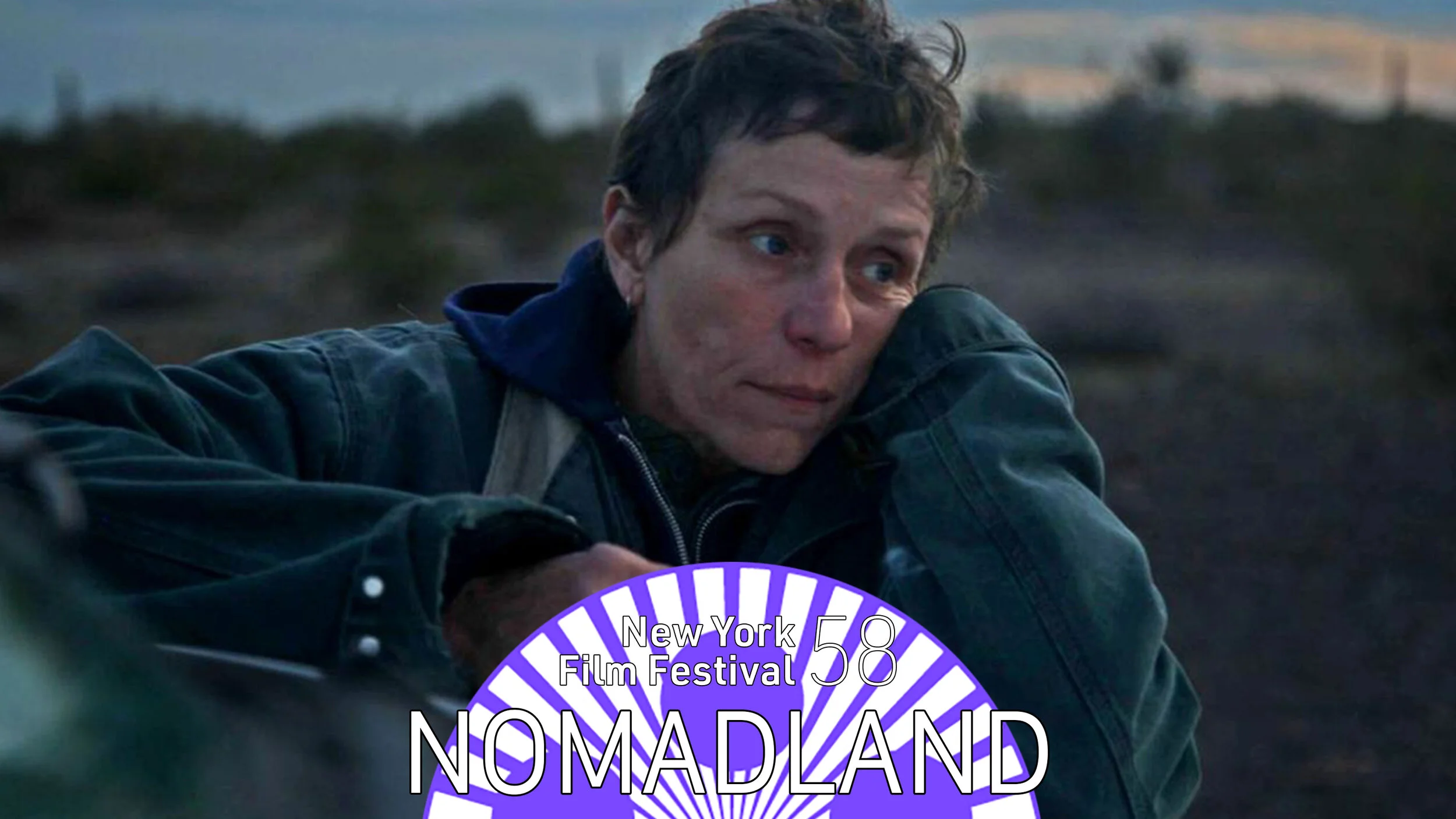NYFF 58 Review: Exploring Inward and Outward in ‘Nomadland’
“see you down the road.”
After Songs My Brothers Taught Me and The Rider, writer/director Chloé Zhao continues to take her camera into the rarest of places in Nomadland. Simultaneously turning the lens out wide over the vast American West and also inwards on the human spirit, she manages to capture great swaths of emotion. Pulling from Jessica Bruder’s non-fiction book “Nomadland: Surviving America in the 21st Century,” the film is a loosely structured character study of Fern, a widow in her sixties living in a camper van. Portrayed by Frances McDormand, Fern forges her own path across the country in a way that feels almost more documented than scripted.
“I’m not homeless. I’m just… houseless,” her reasoning is confidently put, but barely conceals her melancholy. “Not the same thing, right?”
Fern has left the last possessions of a previous existence in a freezing storage unit, and is setting off on a drive. She coasts through seasonal work across the United States harvesting beets, scooping chili, and cleaning rest stop bathrooms. She is entirely alone, and very purposefully so. Her relationships with others are fleeting, but she’s never without a wry smile and a humble generosity that’s effortlessly conjured by McDormand. Through subtle moments, Fern is characterized as a fastidious and capable individual, outfitting her unassuming vehicle, “Vanguard,” to serve as her entire home. It is quickly apparent that her traveling is no vacation road trip but rather a weary roving with no set destination. At times it is extremely daunting to watch her navigate the bleak desolation she has chosen for herself. Nestled beneath a pile of blankets in only the glow of a Christmas Santa lamp, she has no choice but to wait out a snowstorm, until a gas station attendant shouts that she must move the van. With the knowledge that a flat tire or stalled engine could have severe bodily consequences, the grave concern with which others regard her feels all the more authentic.
Orbiting toward a collective of itinerant motorists in the twilight of their years, Fern enters something of a support system. She is invited to join their Rubber Tramp Rendezvous, a gathering in the desert as they share their stories and teach newcomers the minutiae of parking spaces and bucket toilets. Zhao has already proven herself as a nimble and emotive director capable of dramatizing true stories. Even after her two previous features, she is still deeply interested in the complexities of non-actors portraying themselves. She surrounds McDormand with the people who do spend their days traveling the countryside, and the film is rewarded for this with a poignant humanity.
The gentle vulnerability provided by these supporting roles make Fern’s brief friendships impossible to forget; they pry her heart open and it’s brilliant to behold her full emotional range. She even relents to a dance with kind nomad Dave (David Strathairn) as a country band croons, “have you ever thought of getting by with me?” But that kind of relationship just isn’t for Fern, and she drives on. The vastness of America is still small enough that she and Dave’s migration paths cross again in another season. An offer of permanence, stability, and love is made, but she doesn’t feel right in that Norman Rockwell-esque painting. Once again she turns to the road.
Evident from the minimalist pre script, the reason Fern got started moving was to avoid being swallowed by the obscurity and grief that came along with the dissolution of her hometown. With the closure of its gypsum plant—Empire, Nevada was felled by the Great Recession as Fern was also confronted by devastating personal loss. She left behind the dilapidated sheetrock plants and track housing, and the ghost that haunts the ghost town. This lost history of working America is also juxtaposed with the soulless grind of the present at an Amazon warehouse. The season Fern spends picking packages is overrun with noise and harsh light, defined by impersonal solitude. Nomadland identifies isolation as a creeping symptom of capitalism for the aging. This sense of becoming unmoored and forgotten later in life threatens many in small communities in decline. The motivation is only semi-fictional for the retirees of Rubber Tramp Redezvous, as they all came to be a part of the film through their search for healing and peace in the wide open and unknown. Simultaneously, they are a source of recognition and caring for each other in a system that no longer attributes them value. The film lights the Rendezvous’ individual collectivism as the last chance many like Fern have to survive.
McDormand gives a nebulous spirituality to the way Fern moves through the world, surveying infinite deserts and jagged peaks tinted with the colors of a sunrise with an indecipherable smile on her lips. Her sense of belonging is strongest in the transient spaces of others, finding unique rapture in the highway truck stop and the tourist trap dinosaur. She takes the shape of Ophelia in the overgrown river- supine, serene, one with nature and yet also tragic. This immaterial desire to know oneself inwardly by exploring the world outwardly is perhaps best mirrored by Fern’s friend Swankie as she helps the elderly woman in preparing to take her last trip, refusing to spend her precious last days in a hospital. Her final correspondence to Fern feels like it is actually sent from an awe-inspiring afterlife. The great beyond is made navigable, and a nomad learns to never say a goodbye, but rather “see you down the road.”
Zhao’s representation of these very real lives both captures the nuance of their emotional journey while also using American landscapes as the backdrop to paint them into a kind of unsung folk hero. It is the sort of film that will continue to remain relevant through its timeless beauty and elegiac compassion.



